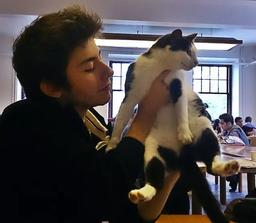If a sentence has both a subject and a direct object the subject is the actor and the direct object is acted upon. For example in the sentence He is reading a book, He is the subject, because He is doing the reading, while a book is the direct object, because it is the thing being read. It is acted upon by the subject.
| Sentence | Finding the subject | Subject | Finding the object | Direct object |
|---|---|---|---|---|
| He is reading a book. | Who is reading? | He | What is he reading? | a book |
| I am drinking tea. | Who is drinking? | I | What am I drinking? | tea |
| We are eating the soup. | Who is eating? | We | What are we eating? | the soup |
In Turkish, the direct object gets a suffix when it is definite. The direct object is definite when it refers to a specific object or a specific collection of objects that is known to the addressee (the addressee is the person whom the sentence is directed to).
In the sentences above a book is not definite, because the addressee doesn't know which book the subject is reading. The direct object tea is also not definite, since the addressee only knows that I am drinking tea, not which tea I am drinking. In the last sentence however, the soup is definite. The addressee here knows which soup we are talking about, for example because it has already been mentioned before in the conversation.
In Turkish, the definite direct object receives the accusative case suffix, which is (y)İ. The y is between parenthesis again, since it is only used when the direct object ends in a vowel, acting as a buffer letter to prevent two consecutive vowels.
Now let's translate the sentences above. Note that in Turkish you don't eat soup, but you drink it.
| He is reading a book. | (O) (bir) kitap okuyor. |
| I am drinking tea. | (Ben) çay içiyorum. |
| We are eating the soup. | (Biz) çorbayı içiyoruz. |
See the table below for a reminder of how to replace İ according to major vowel harmony.
| If the last vowel of the object is | i or e | ı or a | u or o | ü or ö |
| replace İ by | i | ı | u | ü |
Proper nouns receive an apostrophe before a case suffix. Proper nouns are names referring to specific entities such as persons, corporations, cities and countries.
| You are listening to Selma. | (Siz) Selma'yı dinliyorsunuz. |
| They love Istanbul. | (Onlar) İstanbul'u seviyorlar. |
| He is looking for Mehmet. | (O) Mehmet'i arıyor. |
| You are drinking the water. | (Sen) suyu içiyorsun. |

